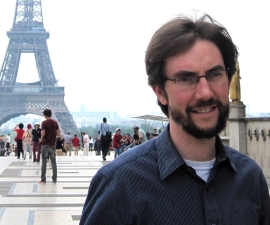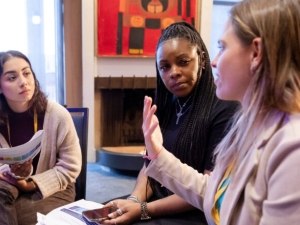

Research Bio
Ethan Katz an associate professor of History & Jewish Studies. He is a historian of modern Europe and the Mediterranean, with specialties in modern Jewish history and the history of modern France and its empire.
To date, his scholarship has focused in four principal areas. The first is the history of Jewish-Muslim relations and the nature of belonging and exclusion in modern France and the Francophone world. These were the central themes of his first book, The Burdens of Brotherhood: Jews and Muslims from North Africa to France (Harvard University Press, 2015). There he traced the entangled and disparate paths of Jews and Muslims in France since World War I, and their triangular relationship with one another and with the French state and notions of what it means to be French. Along with several other scholars, he has revisited many of those themes in light of recent developments in France in a forthcoming special issue of the journal Jewish History entitled "Jews and Muslims in France Before and After Charlie Hebdo and Hyper Cacher" (co-edited with Jonathan Judaken) In the course of the research for his first book, he developed a strong interest as well in a second area, the history of Jews in colonial societies. His co-edited book (with Lisa Moses Leff and Maud Mandel) Colonialism and the Jews (Indiana, 2017) offers the most extended examination to date of Jewish history in light of the new colonial history (and vice versa), focusing on the Francophone sphere but including comparisons that stretch as far as the British Antipodes, the Russian hinterlands, and Eastern European colonial aspirations in Latin America.
His new book project takes many of these themes in a new direction and enters into a third field, Holocaust Studies. This project, provisionally entitled Freeing the Empire: The Jewish Uprising That Helped the Allies Win the War, will chronicle the fascinating yet little-known story of an uprising in Algiers from 1940 to 1943 that proved vital to the success of Operation Torch. The insurgents of Algiers were made up of mostly Jewish shock troops working alongside arch-conservative French officers and businessmen and coordinating with the Allied forces. This book offers a micro-history in global context, examining in intricate detail the makeup and operations of this movement, while using their story to remap the wider history of Jewish wartime resistance; it reassesses as well such issues as the meaning of the choice to resist and the complex relationship between colonialism and the Holocaust.
The final major interest in his work has been the need to rethink the relationship between the secular and religion in modern Jewish life. This was the subject of another co-edited book (with Ari Joskowicz), Secularism in Question: Jews and Judaism in Modern Times (UPenn Press, 2015), which attempted the first sustained engagement between the so-called "secularism debate" of the last 20 years and Jewish studies. He is currently co-directing (with Elisha Ancselovits and Sergey Dolgopolski) a joint initiative of scholars from North America, Israel, and Europe that takes these issues in new direction. Their focus is at once to break down and better understand the chasm between more text-focused, often traditionalist perspectives on Jewish studies and those that emphasize more context and theory. This project, entitled "Devotion and Relativity, Text and Context: New Frontiers of Jewish Literacy," will be launched with a two-day international, interdisciplinary workshop in New York City at the Center for Jewish History and Yeshivat Maharat. In all of his work, transnational and comparative perspectives are fundamental to the approach, and he frequently draw insights from various disciplines outside of History.
Research Expertise and Interest
Jewish history, modern France, empire, Jewish-Muslim relations, secularism

